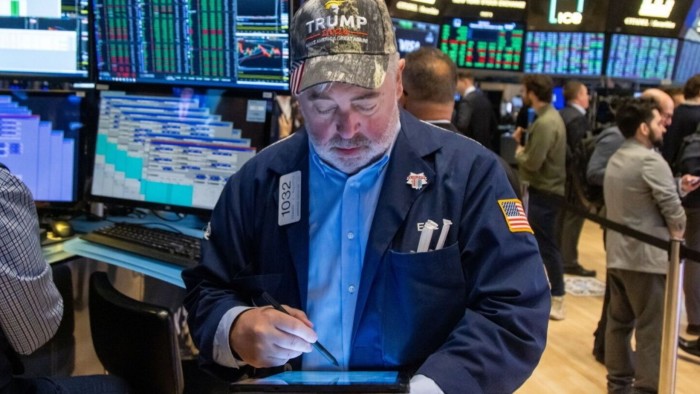Unlock the Editor’s Digest for free
Roula Khalaf, Editor of the FT, selects her favourite stories in this weekly newsletter.
The writer is a financial journalist and author of ‘More: The 10,000-Year Rise of the World Economy’
Political turmoil seems to be everywhere these days. Not just in the Middle East but in nations such as France and Germany. In other countries like the US, political polarisation is intensifying. The proximate causes may differ but the underlying problem seems clear; it is hard to keep voters in a democracy happy when their standard of living is not improving.
In the midst of all this popular discontent, the equity markets couldn’t be happier. US equity indices are regularly hitting all-time highs and the S&P 500 index is up nearly a quarter this year. The FTSE 100 index rose above 8,000 in April and has not dropped below that level since, holding on to a gain of about 5 per cent for 2024. Even Germany’s Dax 40 is about 18 per cent higher than at the start of 2024 despite the country’s economic and corporate problems.
What explains the disconnect? It is certainly not the growth outlook. The latest OECD report shows that European countries, as well as Japan, will only manage GDP growth in the 1-1.5 per cent range over the next two years. In the US, growth is expected to slow in 2025 and 2026 from the near-3 per cent rates achieved over the past two years. These are hardly the “roaring Twenties” that some hoped for at the start of the decade.
A key reason is that the experience of the ordinary voters and the experience of the corporate sector are quite different. The profit margins of US large companies are close to an all-time high, according to Jefferies research. Although some of the plans of president-elect Donald Trump, such as widespread tariffs and mass deportations, seem quite alarming, investors are not too concerned. They think Trump will retreat from the most extreme measures and focus on a market-friendly programme of deregulation and tax cuts. They are betting the house on US exceptionalism. The US stock market is a global behemoth, comprising 73 per cent of the MSCI World Index at the end of 2023, compared with the US’s 26 per cent share of global GDP.
Nevertheless, the US, like Europe, suffers from voter discontent. Even America’s superior growth record was insufficient to re-elect the Democrats since inflation had eroded voters’ standard of living. The long-term problem is that voters are happy to demand public services but less content to pay the taxes that fund them. In the past, this circle was squared through economic growth. Without growth, economic policy becomes a zero-sum game, in which gains for one group can only come at the expense of losses for another. And the losers are always more angry than the winners are grateful.
In the fallout, developed economies seem to be heading for one of two outcomes: plutocracy or gridlock. Plutocracy has clearly won in the US where Elon Musk, the richest man in the world, helped finance the campaign of Donald Trump and has been given the brief of cutting government spending.
In Europe, gridlock has the upper hand. Proportional representation leads to a fragmentation of parties, making it harder to create a stable governing coalition. Gridlock makes it difficult for governments to pass budgets (as demonstrated by France) or to deliver the kind of reforms that might boost economic growth (as in Germany).
And it is difficult to see how growth can significantly accelerate. Europe’s working age population is expected to decline 15 per cent by 2070. The EU has a birth rate of 1.46 per female which means that immigration will be needed to boost the population. But the need for immigration has led to a politically toxic debate in which anti-immigration parties are steadily increasing their vote, something that makes the formation of a stable government even more difficult. Nor is the US entirely immune from this problem. At 1.8, its birth rate is better than the EU’s but below replacement rate. Since mid-2023, the growth in the US labour force has stemmed entirely from immigration (legal and illegal) according to Dhaval Joshi of BCA Research.
As this column takes the long view, it is very hard to be optimistic about the outlook for democracy. As noted above, plutocracy can be self-sustaining and may spread outside the US. Gridlock may also degenerate into one-party rule when nationalist parties take charge. As has been seen in Hungary, governments can maintain their own rule by undermining such bulwarks of a liberal democracy as a free press or an independent judiciary.
Eventually, all this may rebound on investors. Profit margins cannot go up forever and eventually populist parties may turn their firepower on to the corporate sector. Furthermore, a world in which governments are ruled by nationalists is a world where the free movement of goods and capital, as well as people, will eventually be restricted.
Investors got a very good deal out of the post-1945 international order in which by and large, national governments played by the rules. But now the rule book is being torn up. It may turn out that stock markets are like the first-class passengers on the Titanic; toasting each other with champagne as the boat bears down on the iceberg.

